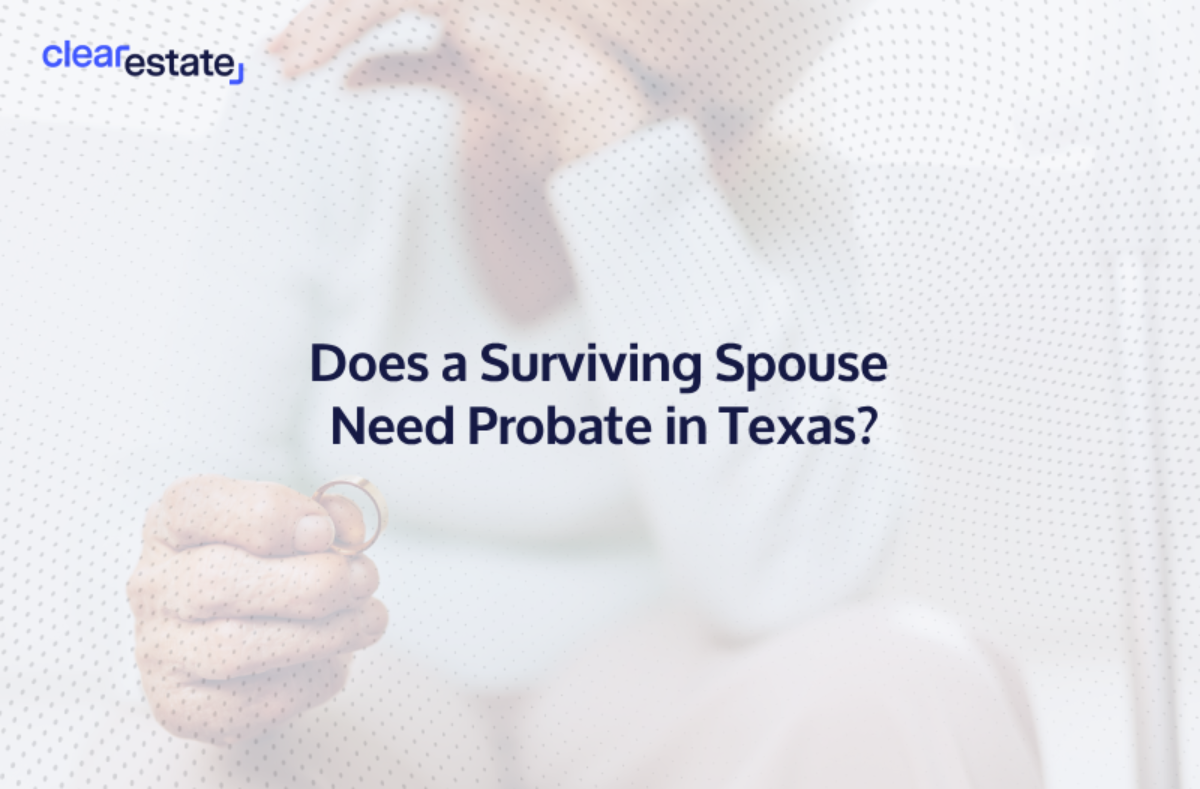Estate Settlement
May 01, 2025
What to Do When Someone Dies in California
Follow this step-by-step guide to navigate legal duties, probate, and estate tasks with clarity and confidence.
Learn when surviving spouses in Texas need probate. Understand community property rights, probate alternatives, and estate planning strategies.


As an estate and probate professional, I've seen many surviving spouses in Texas face uncertainty about whether they need to go through probate after losing their partner. You might assume that being married automatically transfers all assets to you, but that's not always the case in the Lone Star State.
In this article, we'll explore the situations where a surviving spouse may need probate in Texas, your rights under state law, and potential strategies to simplify the process or avoid it altogether. Let's dive into the complexities of probate for surviving spouses in Texas.
Probate is the legal process of administering a deceased person's estate, including validating any wills, paying debts, and distributing assets according to Texas law. This court-supervised procedure ensures that the deceased's wishes are carried out and that creditors have an opportunity to make claims against the estate.
A surviving spouse in Texas may need probate in the following situations:
However, probate may not be necessary if all assets are jointly owned with right of survivorship or have designated beneficiaries.
Use this calculator to quickly assess if probate might be necessary for a surviving spouse in Texas. Remember, this is a general guide and not a substitute for legal advice.
Texas follows community property laws, meaning most assets acquired during marriage are jointly owned. This includes income earned by either spouse and property purchased with that income. Separate property includes assets acquired before marriage or through inheritance or gift.
Community Property: What You Share
Separate Property: What's Yours Alone
As a surviving spouse, you automatically own half of all community property. However, your spouse's half of the community property and their separate property may be subject to probate, depending on whether there's a will and its specific provisions.
Without a will, Texas intestate succession laws determine how assets are distributed. Surviving spouses may not inherit all assets automatically, especially if there are children from a previous relationship. In such cases, the deceased spouse's share of community property may pass to their children, with the surviving spouse retaining only their own half.
For Community Property
For Separate Property
Certain assets pass directly to the surviving spouse without probate, such as:
These assets transfer automatically upon death, regardless of what the will states or intestate succession laws.
Establishing a living trust can help avoid probate in Texas by transferring assets into the trust. Assets held in a trust pass to beneficiaries without going through probate, potentially saving time and money.
Creating community property with right of survivorship agreements ensures assets pass directly to the surviving spouse. This arrangement allows the entire community property to transfer to the surviving spouse without probate, not just the deceased spouse's half.
If the estate's value is under $75,000 (excluding the homestead), a Small Estate Affidavit can be used to transfer assets without formal probate. This is a simpler and quicker alternative for eligible estates, allowing heirs to collect property by submitting a sworn statement to the court.
The surviving spouse may claim certain exemptions, protecting the family home and some personal property from creditors during probate. Texas law provides strong protections for the homestead, allowing the surviving spouse to continue living in the home even if it was the deceased spouse's separate property.
As a surviving spouse in Texas, understanding your rights and options regarding probate is crucial for protecting your assets and honoring your partner's legacy.
While probate may be necessary in cases involving separate property or blended families, there are effective strategies to simplify or even avoid the process. From leveraging community property laws to utilizing small estate affidavits and implementing smart estate planning tools, you have various options at your disposal.
However, the complexities of Texas probate law can be overwhelming during this challenging time. That's where our team of probate specialists comes in. We offer personalized guidance and support tailored to your specific circumstances. Don't face this complex process alone – book a free consultation with our experienced probate experts today. Let us help you secure your financial future and find the most efficient path forward in handling your spouse's estate.
 Simplify Probate Today
Simplify Probate Today
Get expert guidance from our specialists who've helped 10,000+ families.
Book a free consultation